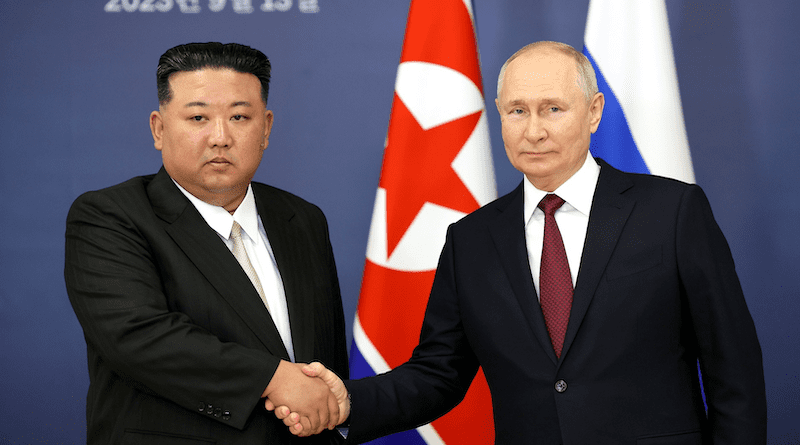Why Was Kim Jong-In In Russia? – Analysis
By IPCS
By Dr. Sandip Kumar Mishra
It was a bit surprising that the North Korean leader Kim Jong-un’s first foreign visit after the pandemic was to Russia, on 10 September 2023. His visit may be considered symbolic of his prioritisation, with Russia appearing to be more important than China. It is also remarkable that Kim Jong-un’s six-day trip was his longest ever visit to a foreign country. Interestingly, Russian President Vladimir Putin also travelled around 4,300 miles to meet Kim in Vostochny Cosmodrome.
The growing proximity between North Korea and Russia can be gauged also from the fact that in July 2023, when North Korea celebrated the 70th anniversary of the Korean War Armistice Agreement, Russia sent its Defence Minister Sergei Shoigu to participate. It was quite a contrast to the Chinese delegation, which was led by Li Hongzhong, who is ranked 24th in the Chinese Communist Party, though he has the designation of vice premier. Equally important is that even though Russia is involved in a prolonged war, Putin and Sergei Shoigu have both spared time to meet the North Korean leader. It would however still be premature to assume at this point that there is a big tectonic change in North Korea’s relations with China and Russia. These developments appear to be driven by pragmatic North Korean, Russian, and Chinese considerations.
From Russia’s point of view, North Korea has more salience for its foreign policy in the wake of its ongoing military expedition in Ukraine. There are reports that North Korea has been supplying artillery and other military equipment to Russia, and in all probability, Russia would like the supply to continue or further increase. Pyongyang is expected to supply ammunition to refill Moscow’s inventory, which has drained substantially as the war has stretched for more than a year and half.
From North Korea’s point of view, this would mean more economic activities in the country so as to increase its ammunition production. For a continuous supply of ammunition and artillery shells, Pyongyang would need sufficient energy and fuel, which it expects to obtain from Moscow. We could also expect some new military and space technologies to be shared by Russia, which would augment North Korea’s defence capacity.
For North Korea, Russia is a country that has successfully defied international norms and institutions, especially through its actions in Ukraine. This means that Moscow wouldn’t be as bothered about lending assistance to Pyongyang despite the international sanctions imposed on it. North Korea has also sensed that China is facing a challenging economic situation. After US Secretary State Antony Blinken’s meeting with the Chinese State Councillor Wang Yi in February 2023, China has reportedly restrained itself from providing military assistance to Russia and North Korea. In May and June, the US once again suggested that any Chinese assistance to Russia and North Korea would be considered an evasion of sanctions. China’s economic difficulties are indeed real, and the country appears to be relatively circumspect in its defiance of the international community and multilateral sanctions. For the same reason, North Korea feels that it would be better to use this opportunity as an opening towards Russia.
An arm deal between North Korea and Russia thus appears to be the primary reason for Kim Jong-un’s recent visit. In fact even before his trip, Kim made several visits to arms production factories in North Korea, with speculations suggesting that these were inspections to check the quality and quantity of North Korean arms production that could be shipped to Russia. In Russia, too, Kim and Putin met at the space launch centre. Afterwards, Kim visited several Russian military sites, where he was seen appreciating Russian advanced weapons, production centres, nuclear-capable bombers, fighter jets, and hypersonic missiles.
During his visit, Kim Jong-un reiterated North Korea’s full and unconditional support to Russia. Both countries said that they would expand “strategic and tactical coordination” between their armed forces. Further, Kim has reportedly invited Putin to Pyongyang for a reciprocal visit, which the latter has accepted.
Even though it is difficult to imagine a scenario in which Russia willingly shares its sensitive and high-tech weapon technologies with North Korea, Pyongyang will be happy with any limited success. Contrary to expectations, food and economic aid and bilateral trade were not priority in Kim Jong-un’s visit, though they may still happen if North Korea-Russia proximity in defence cooperation increases.
Dr. Sandip Kumar Mishra is Associate Professor, Centre for East Asian Studies, SIS, JNU, & Distinguished Fellow, IPCS.

